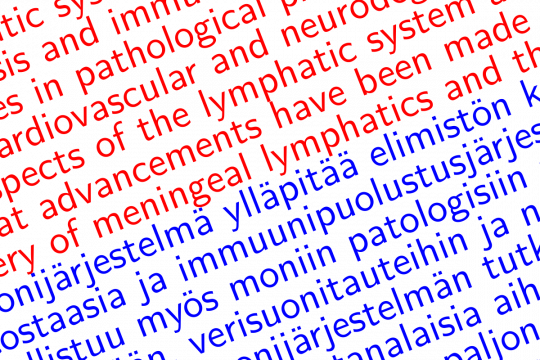English or Finnish?
Von jeltsch am Mi, 03/26/2025 - 12:47


I am teaching to Bachelor, Master and PhD students at the University of Helsinki. While almost all Master’s and PhD theses in the life sciences are written in English, I am always discussing with BSc students the question of whether to write the thesis in Finnish or English. I am comfortable with both Finnish and English, but when you need to decide, you might want to consider a few things:
Good reasons why you would want to write your BSc thesis in English
- You are into "science", and you plan a more scientifically oriented career (research scientist at a Pharma company, a biotech startup or in Academia). In that case, you don't do yourself a favor by writing in Finnish. Almost all (99.9%) of the important primary literature will be in English. If you even remotely think about working abroad, this exercise in English will be a first preparation. But even if you are working in a lab in Finland, you could easily end up in an English-first language environment. At one time, we had a majority of Germans in the lab, but even the Germans still preferred to talk in English most of the time...
- Your supervisor prefers English (or doesn't know Finnish). That is a biggie. But even with a supervisor who is comfortable with reading a Finnish thesis, there can be some issues. Many excellent Finnish scientists do not want to read Finnish scientific texts because they deal mostly with English texts and thus are unfamiliar with good scientific Finnish language. Some of them have openly stated that they themselves are not able to produce a good scientific text in Finnish. For my specific situation, that means I am perfectly able to understand your Finnish writing, and I can give you feedback from a scientific (content) angle. But I am not able to judge whether your text would qualify as "good scientific Finnish language". This discrepancy can lead to disappointments when your supervisor is ok with a linguistically terrible text, because he can only evaluate the content, while any Finnish native speaker would realize that the language is inadequate for a scientific text.
- Obviously, the topic is important. Some research topics lend themselves more easily to either writing in English or writing in Finnish. One example of a topic that IMHO could probably work in Finnish is "Prescription behaviour of Finnish pharmacies after making biosimilars interchangeable by default". But a topic like "Polyols and cardiovascular disease - clinical evidence and possible mechanisms" might be easier to write in English because almost all the source material would be in English. Although there is a Finnish angle to this topic as well - notably the fact that the sugar alcohol xylitol was first scientifically studied for its effect on tooth decay in Finland and xylitol was first mass-produced by the Finnish company Suomen Sokeri Oy.
- What audience do you want to reach? Be aware that, by default, your thesis is a public document. By writing in Finnish, you reduce the potential number of readers by a factor of more than 1000. Why might that be important? We had some BSc students writing excellent theses that should be, IMO, made available to a larger audience. In fact, we have started to convert one of them into a review article. I am sure this article will be published someday, but given the high workload of everybody involved (after the BSc thesis = before the MSc thesis), this process is on the back burner.
Good reasons why you want to write your BSc thesis in Finnish
I first wanted to keep this part short by writing “None”! However, this would be too simple.
- It is the recommended default at the University of Helsinki (together with Swedish).
- Your supervisor prefers Finnish. That's a biggie.
- Your English is not very good. While I have heard this argument, it has been losing its power over the years. Using translation tools and grammar-checking tools (all of which describe themselves these days as "AI-powered"), it has been easier than ever to generate sufficiently well-written text. You still need to write a logical and coherent text because these tools cannot work wonders (remember: garbage in → garbage out). But the foreign language itself is not a limit anymore.
- You absolutely know that you are going to work in a customer-oriented position in Finland, in a place where the majority language is still Finnish, for the rest of your life. Be aware that at the moment, about 25% of the inhabitants of the capital region have a so-called "foreigner background". Also, be aware that if the trend continues, sometime in the second half of this century the majority language in Finland will not be Finnish anyone.
- Your command of written English is excellent, and you do not need to exercise it. Instead, you want to exercise your Finnish. I used a similar argument to convince myself to participate in the writing of a scientific article in Finnish: https://www.duodecimlehti.fi/lehti/2020/16/duo15739.



